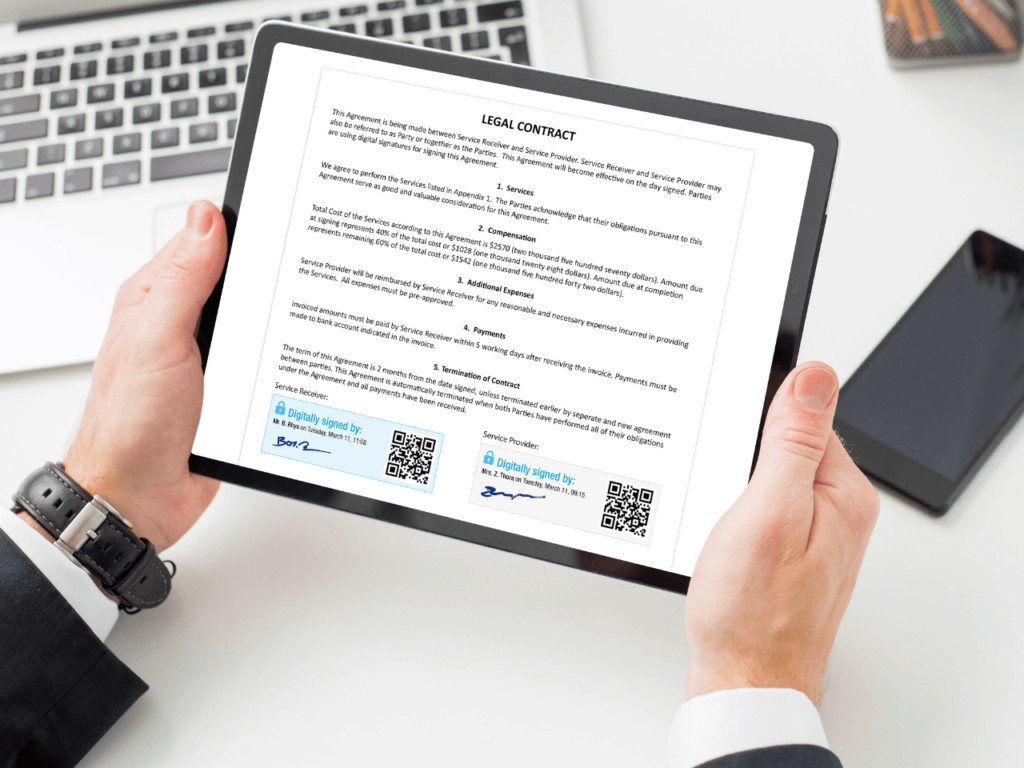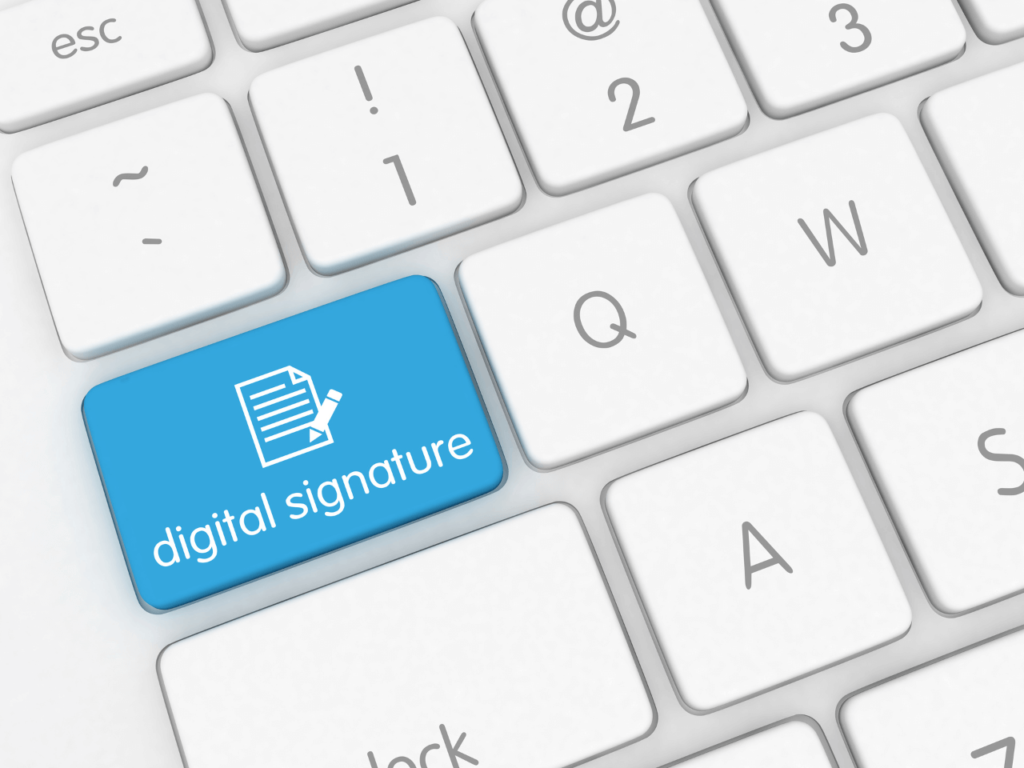A Digital Signature is the electronic or digital counterpart of a physical signature. Similar to how a physical signature on a paper document verifies its source, a digital signature applied to a digital document (computer file) confirms the authenticity of that digital content. In comparison to physical signatures, digital signatures offer significantly enhanced security and are virtually immune to tampering.Physical signatures are easily replicated or ‘forged’. On the other hand, the technology behind Digital Signatures makes it virtually impossible to forge them.

A digital signature is NOT a scanned version of a physical signature.
Because of the higher security associated with Digital Signatures and the many advantages associated with storing documents electronically (as opposed to paper), governments in many countries have passed laws and regulations encouraging (and in some cases mandating) the usage of digitally signed electronic documents rather than paper documents.
How do you Digitally Sign a Document?
Being able to Digitally Sign a document requires the person to possess a Digital Signing Certificate, sometimes referred to as a Digital Signature Certificate (DSC). A DSC contains a “Private Key” that enables the owner to create a unique Digital Signature on a particular document. This is done by using specialized software, called Digital Signing Software, such as one offered by Truecopy Credentials. Such software performs mathematical operations involving the Private Key and the contents of the document itself, to produce the Signature.
A Digital Signature is a sequence of ‘bits’ or a code that has some special characteristics. A code generated for a particular document by using a particular signer’s Digital Signature Certificate is unique. An identical code cannot be generated by another signer for the same document or by the same signer for another document. This means that only the unique combination of that particular document and that particular signer’s Digital Signature Certificate can generate a particular digital signature. Needless to say, the Digital Signature Certificate and the Private Key in it needs to be maintained securely by the signer. Compromising the Digital Signature Certificate can lead to someone else using it for signing documents.
There are several Digital Signature Tools available for creating and affixing Digital Signatures. Truecopy Credentials Pvt Ltd is the leading Digital Signature Solution Provider in India and provides not only the best Digital Signature Software and Digital Signature tools but also provides Digital Signature Certificate Services, to easily procure DS Certificates at low cost. Truecopy Credentials has established itself as a preferred online Digital Signature Certificate provider because of its exceptional software and services.
Obtaining a Digital Signature Certificate
Certifying Authorities are agencies authorized to issue Digital Signature Certificates (DSC). They are also called Digital Signature Certificate Providers. The process of obtaining a Digital Signature Certificate (DSC) essentially involves establishing the identity of the signer (applicant) to the Certifying Authority. The Certifying Authority requires the applicant to authenticate themselves by providing documents that show proof of identity, proof of residence, etc. The process may also involve recording a video in addition to email and mobile verification.
The Digital Signature Certificate can also be obtained by approaching a Digital Signature Provider such as Truecopy Credentials, who guide you through the step-by-step process of creating an application, followed by verification and downloading the DSC. A Digital Signature Certificate usually has a validity of 2 or 3 years, after which it needs to be renewed.
How do you verify a Digital Signature?
Verification of the Digital Signature refers to the process of verifying the code attached to the document and ascertaining that the code was indeed produced by com combining the contents of the document and the DSC issued to the signer. This process also determines if the document has been modified after the Signature was created. Standard document formats make the verification process simple, by incorporating the above process into their document readers so that the Digital Signature gets automatically verified when the document is opened in the Reader software. This is true about PDF files and Adobe Acrobat software verifies a signature automatically when the PDF file is opened. This is the reason why PDF files are generally preferred when applying or verifying Digital Signatures. Given the associated security and the convenience of verification, such DSC Signatures are accepted in most countries around the world.
When it comes to verifying the Digital Signatures of numerous documents in bulk, the Verification Engine provided by Truecopy Credentials can be very useful. This Digital Signature Verification Engine automatically verifies the signature on each document without any manual intervention.
e-Signatures and their difference from Digital Signatures

In addition to DSC Signatures that are based on Digital Signature Certificates as described above, there are other types of electronic signatures called e-signatures in short. E-signatures do not rely on a private key or a Digital Signature Certificate but are created and affixed on the document in a manner such at the identity of the person affixing the signature can be determined at a later date. The e-signature can resemble the physical signature of the signer, or it could just be the name of the signer written in cursive form.
The e-signature is often generated by sending the signing URL to the signer over email. In many systems, this is also accompanied by the OTP. The purpose is to ensure that the document was indeed signed by the person who had access to the email address and also the mobile phone to which the OTP was sent. While creating e-signatures, information on the signature location, IP address, exact time of signing, etc is recorded as a part of the e-signature. The purpose of recording this information is to retain the ability to further identify the signer at a later date, should it be required.
Such e-Signatures are also considered legal equivalents of physical signatures in several countries. Truecopy Credentials also functions as a provider of e-signature solutions and e-signature services. This makes Truecopy a leading e-signature provider.
Summary
Digital Signatures and Electronic Signatures (e-signatures) are both signing mechanisms that allow users to sign electronic documents/computer files. Depending on the specific application and use case, one or the other of the two may be preferred. Both these approaches allow users to go paperless thereby ensuring higher security and lower costs.



